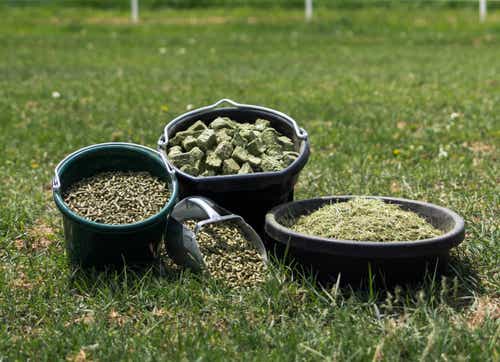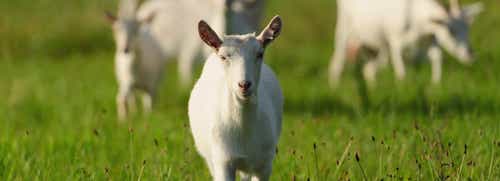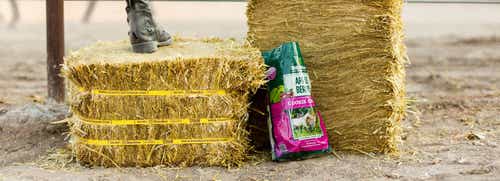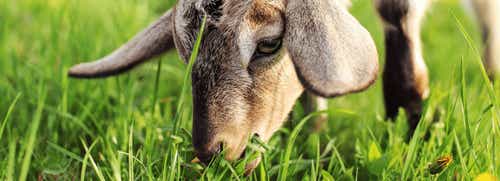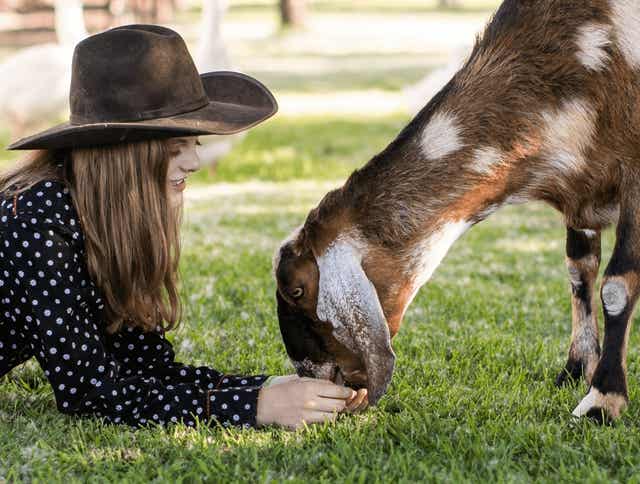
What Do Goats Eat?
Some of the most common questions I get about goats is, “What do I feed them?” Many people expect to hear a quick, one-sentence answer. The questions can also come in a variety of renditions. Should I feed alfalfa or grass? Should I feed baled hay or hay cubes or hay pellets? Plain grain or goat feed? How much should I feed? But as with so many things goat related, the answer is, “it depends.” A doe (a female goat) in milk needs a much richer diet than a wether (a castrated male goat). And goats on pasture have different needs than goats in confinement.
What Goats Need Alfalfa Hay?
Alfalfa is one of the best sources of calcium, which means it’s great for fast-growing, young kids (baby goats), does in the last trimester of pregnancy and does in milk. It is not so good for dry does, bucks (intact male goats) or wethers because they don’t need that much calcium. In fact, calcium binds with zinc, so if a goat is getting more than it needs, they can wind up zinc deficient. Kids are usually about two-thirds grown, somewhere between six months and a year, so at that time, it’s a good idea to transition them over to grass hay rather than alfalfa.
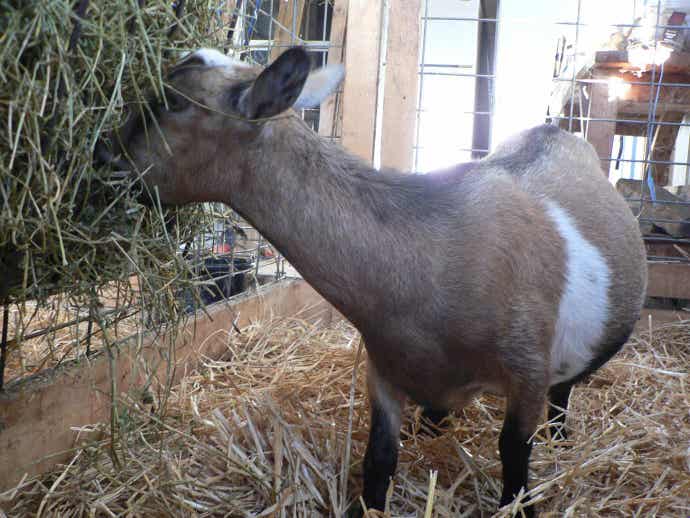
What Goats Need Grass Hay?
Quality grass hay is good for all goats, for at least part of their diets. It’s really the only hay that bucks, wethers, and dry does should have, and it can be fed free choice.
Can you feed hay cubes to your goats?
Hay cubes, which are made for cows and horses, are generally too large for goats to eat. We used to feed cubes as treats for our cows and horses. After we sold them, we had half a bag of cubes left, and I broke the cubes apart into smaller pieces so my goats could eat them. But that’s a lot of work on a regular basis
Can I Feed My Goats Alfalfa or Grass Hay Pellets?
These are both great options for supplementing a goat’s diet, but they cannot totally take the place of baled hay, pasture and browse. Goats need some long-stemmed hay, every day, to keep their rumen functioning at its best. When goats chew, they produce bicarbonate. Long-stemmed hay, grass and browse make goats chew a lot. Hay pellets are pulverized, so goats really don’t have to chew much at all when they eat pellets.
Since the pellets look similar to goat feed, a lot of people equate them with grain and think they need to limit the amount their goats eat. As long as your goats are eating some long-stemmed hay, either in the form of pasture, browse or baled hay, they can eat as much as they want of hay pellets. It is simply ground up hay.
Keep in mind that just as with baled hay, you should only feed alfalfa pellets to milkers, does in late pregnancy and fast-growing kids.
But What If...?
How exactly does this look on a real farm? Many years ago, we were unable to get any grass hay for our bucks, so we wound up feeding them alfalfa. After about two months of eating nothing but alfalfa, they all became zinc deficient. One day, they just stopped eating and were foaming at the mouth and had lost large chunks of hair, leaving bald patches on their bodies in the middle of a very cold January in Illinois. I made a panicked trip to the university vet hospital with six bucks in a minivan, thinking they were all going to die, and was told they had zinc deficiency from excess calcium in their diet.
Today, if I can’t find a good grass hay locally, I buy Standlee Forage Timothy Grass Pellets and feed them as much as they’ll eat. I also give them a flake of alfalfa twice a day that is shared by four or five bucks. That way they have to chew the alfalfa to keep their rumen functioning, but the grass forage pellets reduce the amount of calcium in their diet.
On the flip side, last year I couldn’t get any good alfalfa hay locally. So, I bought grass hay and Standlee Forage Alfalfa Pellets. I fed my pregnant does and milkers as much as they wanted of the alfalfa pellets and gave them grass hay twice a day through the winter.
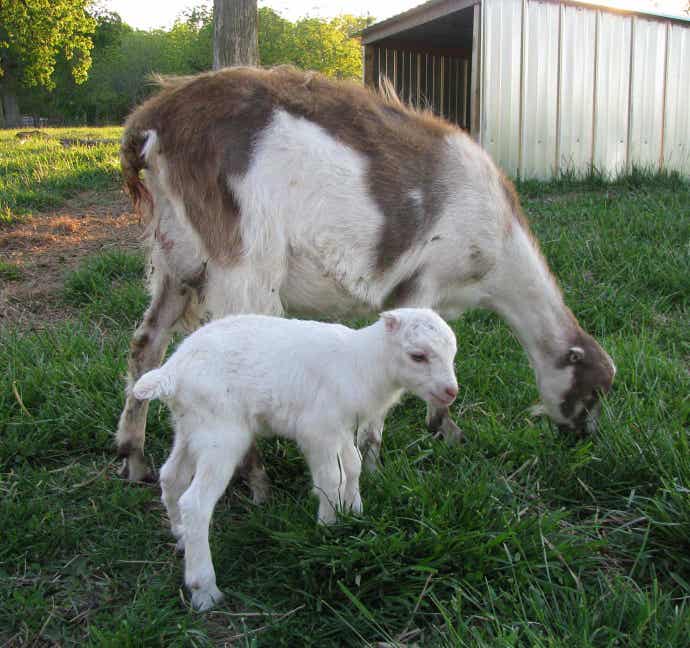
What If My Goat Won’t Eat Hay Pellets?
Not every goat is excited about the prospect of eating hay pellets when they first are introduced to them. I have two tricks that will win over all but the pickiest of goats. First, remember that goats are competitive. If you offer the pellets when they are alone on the milk stand, they might look at like you’re crazy. But if you put a pan of pellets in the middle of a group of goats, they usually want what the other goats are eating, so they’ll all devour the pellets!
Second, most goats are grain hogs, which is why I actually started using alfalfa pellets with my does on a regular basis. I’m not the fastest milker when milking by hand. After I had a bucket busting LaMancha wind up with diarrhea from eating too much grain, I realized I had to find something else to feed her on the milk stand as we were milking her. At first, I tried just adding alfalfa crumbs to her bowl, but she could eat those so fast that I was spending way too much time refilling the bowl because they are kind of light and fluffy. So, I started offering alfalfa pellets. I realized that most goats were a bit reluctant to try them if that was the only thing in the bowl, but if I mixed it with their grain, they’d just go for the grain, and the alfalfa pellets would be eaten up at the same time.
What About Grain or Goat Feed?
As ruminants, goats do best without any type of grain, and goat feed is primarily grain. However, today’s milk goats have been bred to produce a lot more milk than their ancestors, so most everyone I know who has tried to have grass-fed milk goats has wound up switching back to grain because the goats tend to get unacceptably underweight as their bodies continue to produce a lot of milk. Providing a good quality goat feed is typical for does in milk.
Some people start to give their pregnant goats a little goat feed towards the end of pregnancy, just to get their rumen adjusted to digesting grain; then after kidding they work up to the recommended amount, which you can usually find in the feeding directions on the bag. Goat feed and grain should never be fed free choice as it can cause digestive issues such as enterotoxemia, bloat, diarrhea and even death.
Bucks and wethers should not be fed any type of grain or goat feed routinely because it can wind up causing urinary stones, which can kill them. Some people are quick to say that if you feed them alfalfa, the calcium will balance the phosphorus in the grain so that you are not as likely to wind up with stones. But what did we already say about all that calcium? It can cause zinc deficiency, so you could wind up trading one problem for another. Bucks and wethers do not need grain, so just don’t give it to them. A handful as a treat once in a while is not a big deal, but it should not be part of their regular diet. It is also not a big deal if you need to feed a little grain if a buck gets underweight during breeding season, but it should be a short-term addition to his diet.
Sometimes people think they can save money by feeding goats plain corn or oats instead of goat feed, but that is not recommended. Goat feeds are usually about 16% protein whereas corn and oats are half that or less, and the protein is what your milkers need from the goat grain. Plus, goat grains have added vitamins and minerals, which are important to your milkers’ overall health.
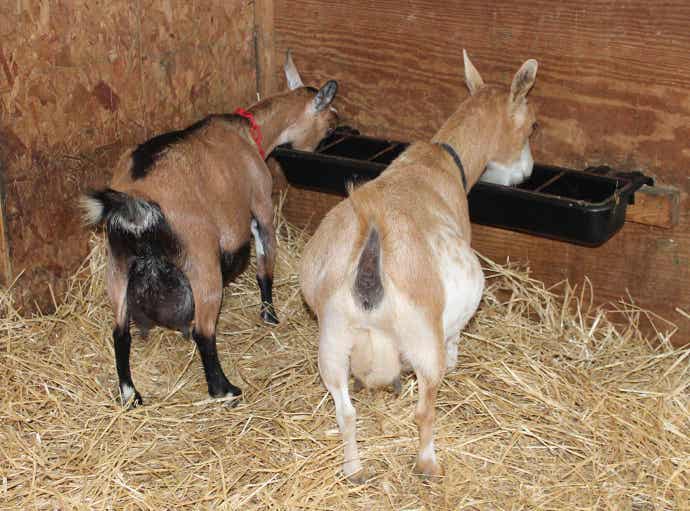
What About Feeding Goats Sunflower Seeds?
A lot of people hear that black oil sunflower seeds are good for goats, but again, it depends. Research has shown that it increases butterfat in milk, but that’s it. So, there is no reason to feed them to pregnant does, kids, bucks or wethers. And seeds are grains, so bucks and wethers really should not have them.
Good Nutrition Is the Key to Healthy Goats!
Many years ago, I realized that everything about your goat’s health is centered on good nutrition. If you get that wrong, you have goats getting sick, not producing to their genetic potential and sometimes even dying. If you get the nutrition right, everything else falls into place. You have healthy goats that get pregnant, give birth to healthy kids and produce as much milk as their genes allow. But the best part is that healthy goats mean happy goat owners.
About The Author

Deborah Niemann is the author of Raising Goats Naturally (2018) and Goats Giving Birth (coming 2020). She has been raising goats since 2002 and has more than 100 articles about goats on her website, ThriftyHomesteader.com.



